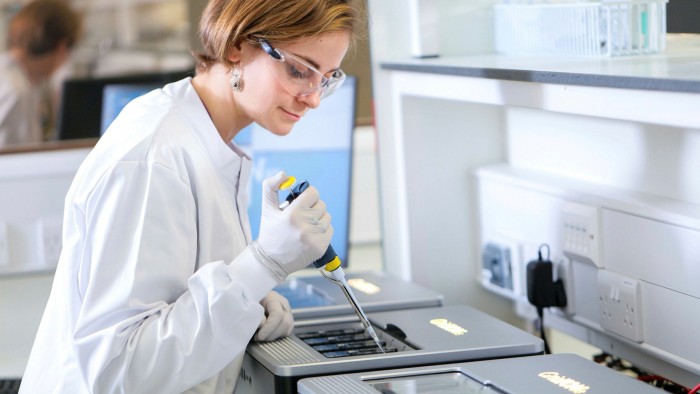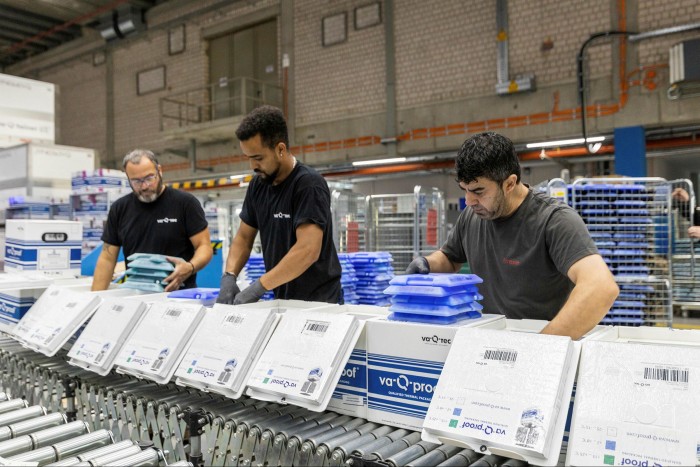Companies that pivot are best placed to prosper


Simply sign up to the Technology sector myFT Digest -- delivered directly to your inbox.
Simply surviving the pandemic with their business models intact was a challenge for most companies. But, for some, Covid-19 turned out to be a catalyst for growth and reinvention.
Among them were the companies a Financial Times panel has judged to be “Tech Champions”. These include Stockholm-based Legimeet, whose founders were inspired by lockdowns to create a start-up that organises online shareholder meetings.
Meanwhile, Oxford Nanopore, which was spun out of Oxford university in 2005, has responded to huge demand, as its DNA-sequencing technology was widely employed for identifying and tracking the spread of Covid-19 variants in some 85 countries. The group floated on the London Stock Exchange in late September at a valuation of £3.5bn.
Part of these companies’ success was down to offering the right services and products at the right time, but that is not the entire story. Great leaps forward require guts and the willingness to try new things at a moment when others are simply getting by.
Companies “that were innovating before the crisis were more likely to innovate during it”, says Andrew Wear, author of Recovery: How We Can Create a Better, Brighter Future After a Crisis. “They have the talent and the organisational structure. You can’t just turn innovation on.”
Indeed, a McKinsey study found that in the first few months of 2020, many executives prioritised cutting costs, maximising efficiency and maintaining business continuity, at the expense of true innovation. Many corporate leaders made significant changes to their processes and policies to adjust to the need to work remotely or socially distance. But that absorbed time and energy that might otherwise have gone into developing new products and services.
“Organisations that become paralysed or only participate in incremental change are those that don’t have the muscle memory of transformation in their ethos,” says Tsedal Neeley, professor of business administration at Harvard Business School. “You need change management as a core competence.”
Successful innovation also requires a focused approach. Many companies plunged into making personal protective equipment, trying to develop Covid medicines or offering online services. Most did not make money.
Companies that prospered during the pandemic were able to align their offering with social and commercial changes, such as working from home or shortened supply chains, but that was not sufficient.
They also tended to make lateral extensions of their existing businesses, rather than shifting into something completely new, and they had a clear path to sustainable profitability, argues Mauro Guillén, director of Cambridge Judge Business School. He calls the process “pivoting”, because companies “kept one foot on the ground and rotated with the other to twist what they were doing”.
Restaurants, for example, traditionally thought of themselves as dining rooms with a kitchen to supply the food. In the pandemic, many owners reoriented to focus on being kitchens that prepared food for delivery.

Examples of pivoting among this year’s tech champions include Starling Bank, a UK challenger bank that jumped into commercial lending during the pandemic, growing its loan book from £54m to more than £2.2bn, largely through offering government-backed coronavirus business interruption loans and bounceback loans.
Similarly, va-Q-Tec, based in the German city of Würzburg, expanded its vacuum insulation and cold chain logistics business to produce insulated boxes that can be used to keep mRNA-based Covid vaccines at the extremely low temperatures required.
Neeley, author of Remote Work Revolution: Succeeding from Anywhere, argues that successful reinvention also requires companies to look outward, in a process she calls “dual transformation”. “There is an interconnectedness that requires work with your partners and your customers,” she says. “It’s not just you, it’s your ecosystem. Otherwise, you will change and no one will be there to receive the product of your transformation.”
Sunday, a restaurant app and another FT tech champion, has signed up more than 1,000 eateries to its service, which allows customers to scan a QR code to pay their bill. That required changing the attitudes of both diners and restaurateurs. “Before Covid, I would never have put a QR code on my table. It seemed gross,” admits Victor Lugger, who co-founded the app and tested it in his French restaurant chain Big Mamma.
Companies that get innovation right are already benefiting. An OECD study of Australia, New Zealand and the UK by Dan Andrews, Andrew Charlton and Angus Moore concluded that high productivity companies have been adding staff in response to the pandemic, while low-productivity ones were more likely to contract.
“A crisis yields a great resorting,” Wear says. “Those who hang on to the past, fail. Those that look forward, succeed.”
In the words of Stanford University economist Paul Romer, a crisis is a terrible thing to waste.
Brooke Masters is the FT’s chief business commentator
Comments